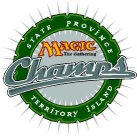Sullivan Library: Innovations from Regionals
My return article is going to be about the results of the last major Standard tournament that hit the newsstands recently. Many of the things that happened were small, but I do think that the last thing I mention in this article is something truly staggering.


 Few writers on this site have discussed it recently because one fact about States has remained constant and obvious: Affinity is the best deck. However, since everyone knows this, Affinity players will have to fight through a wall of hate in order to reach the elimination rounds, a task that won’t be easy. Today, Adrian shares some ideas on how to modify the best deck in the field to better compete against hate, and applies them to what is certain to be the most popular deck at champs. If you plan to play or to beat Affinity this weekend, then you might want to take a look.
Few writers on this site have discussed it recently because one fact about States has remained constant and obvious: Affinity is the best deck. However, since everyone knows this, Affinity players will have to fight through a wall of hate in order to reach the elimination rounds, a task that won’t be easy. Today, Adrian shares some ideas on how to modify the best deck in the field to better compete against hate, and applies them to what is certain to be the most popular deck at champs. If you plan to play or to beat Affinity this weekend, then you might want to take a look.